A Comprehensive Report on Cultural Awareness & Competence of Teachers
VerifiedAdded on 2023/06/11
|15
|3507
|172
Report
AI Summary
This report provides an in-depth analysis of cultural awareness and competence required for early childhood educators, particularly when working with Aboriginal and Torres Strait Islander families. It begins by defining cultural awareness and competence, emphasizing their importance in early childhood education and care. The report then delves into professional and ethical considerations, highlighting the influence of Indigenous history on Australian society. It discusses practices and protocols for establishing relationships and partnerships with Indigenous families, stressing the importance of respecting their values and beliefs. The report also addresses ethical considerations for early childhood teachers, including adopting holistic approaches, being responsive to children's cultural backgrounds, and forming inclusive learning environments. Ultimately, the report underscores the necessity for educators to be culturally competent in order to provide fair and comprehensive education, improve learning outcomes for Indigenous children, and promote reconciliation.
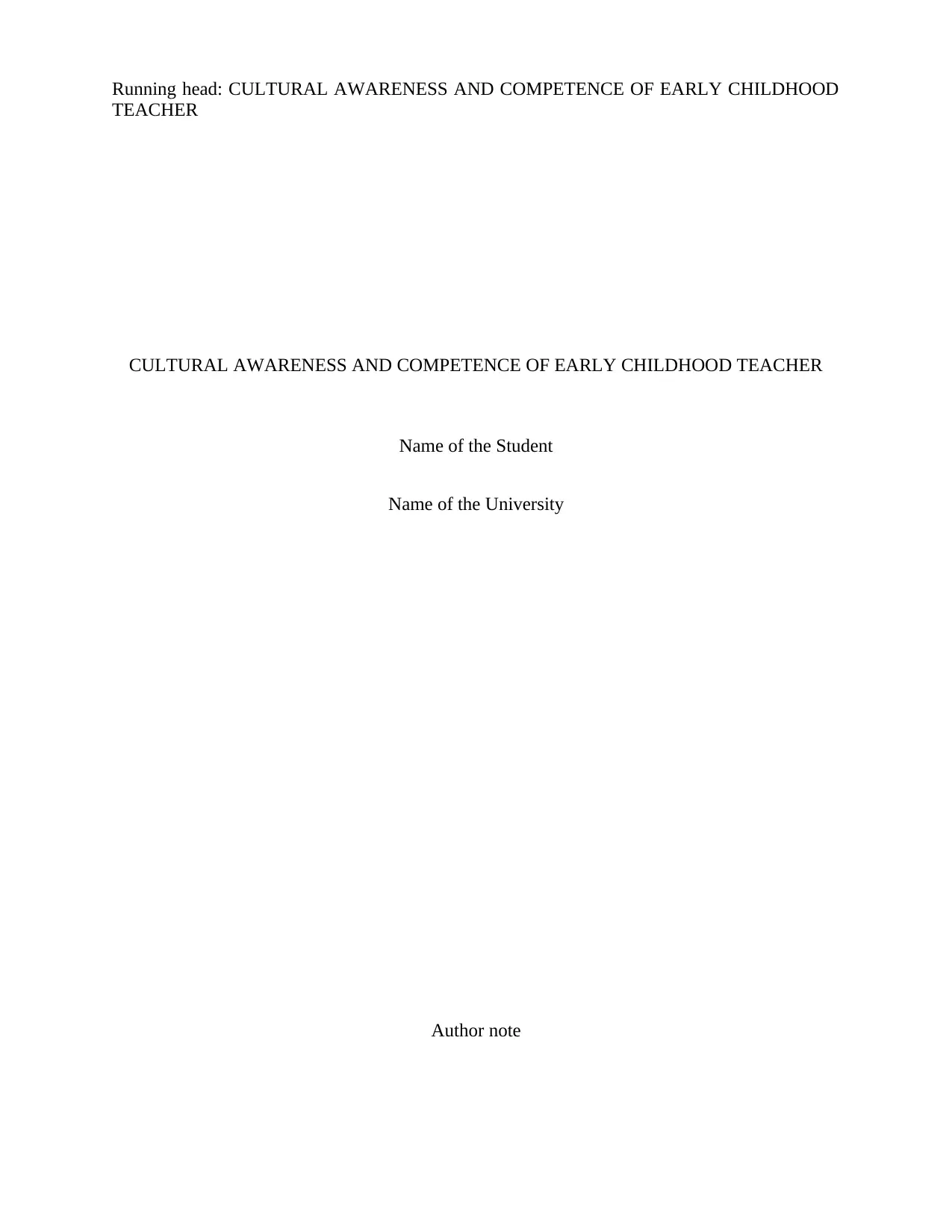
Running head: CULTURAL AWARENESS AND COMPETENCE OF EARLY CHILDHOOD
TEACHER
CULTURAL AWARENESS AND COMPETENCE OF EARLY CHILDHOOD TEACHER
Name of the Student
Name of the University
Author note
TEACHER
CULTURAL AWARENESS AND COMPETENCE OF EARLY CHILDHOOD TEACHER
Name of the Student
Name of the University
Author note
Paraphrase This Document
Need a fresh take? Get an instant paraphrase of this document with our AI Paraphraser
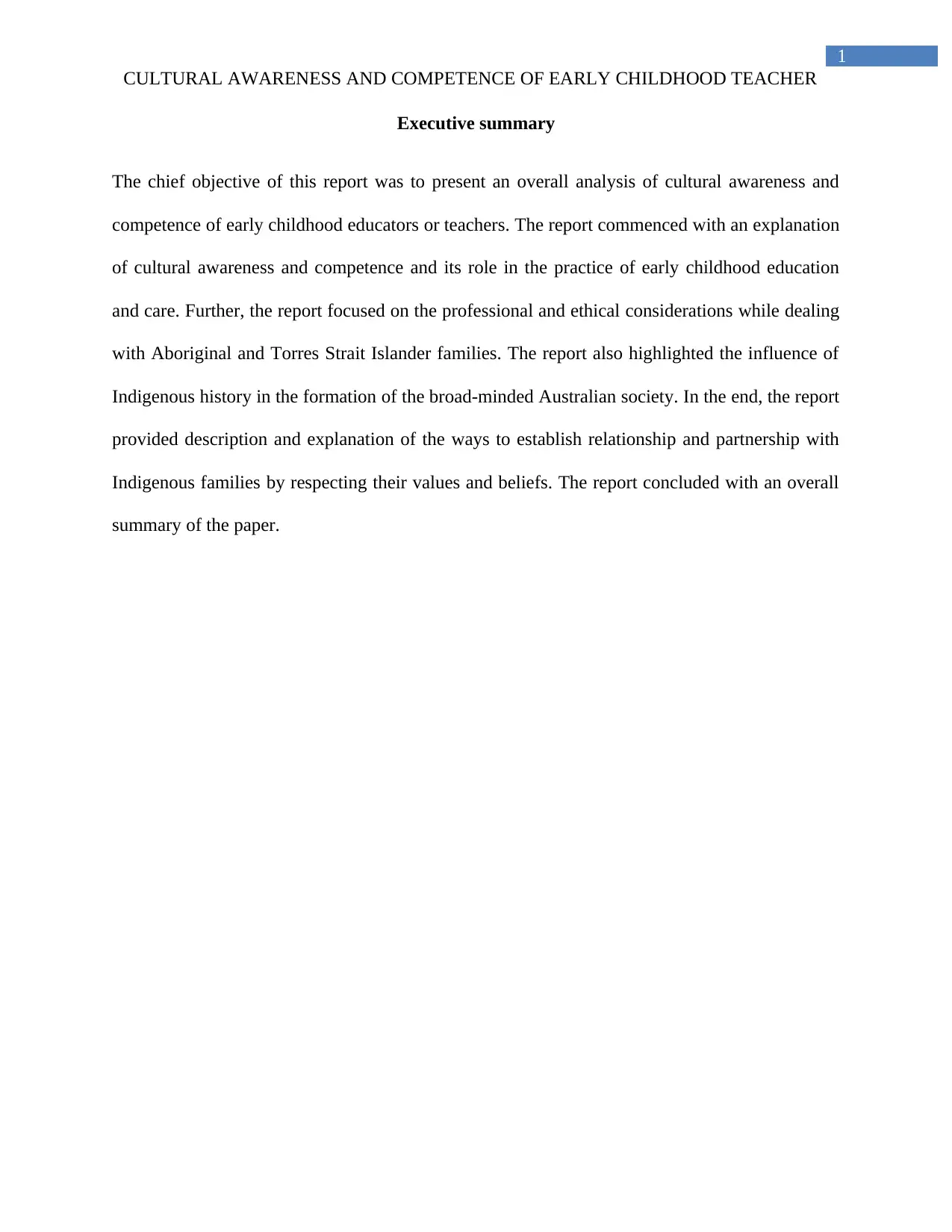
1
CULTURAL AWARENESS AND COMPETENCE OF EARLY CHILDHOOD TEACHER
Executive summary
The chief objective of this report was to present an overall analysis of cultural awareness and
competence of early childhood educators or teachers. The report commenced with an explanation
of cultural awareness and competence and its role in the practice of early childhood education
and care. Further, the report focused on the professional and ethical considerations while dealing
with Aboriginal and Torres Strait Islander families. The report also highlighted the influence of
Indigenous history in the formation of the broad-minded Australian society. In the end, the report
provided description and explanation of the ways to establish relationship and partnership with
Indigenous families by respecting their values and beliefs. The report concluded with an overall
summary of the paper.
CULTURAL AWARENESS AND COMPETENCE OF EARLY CHILDHOOD TEACHER
Executive summary
The chief objective of this report was to present an overall analysis of cultural awareness and
competence of early childhood educators or teachers. The report commenced with an explanation
of cultural awareness and competence and its role in the practice of early childhood education
and care. Further, the report focused on the professional and ethical considerations while dealing
with Aboriginal and Torres Strait Islander families. The report also highlighted the influence of
Indigenous history in the formation of the broad-minded Australian society. In the end, the report
provided description and explanation of the ways to establish relationship and partnership with
Indigenous families by respecting their values and beliefs. The report concluded with an overall
summary of the paper.
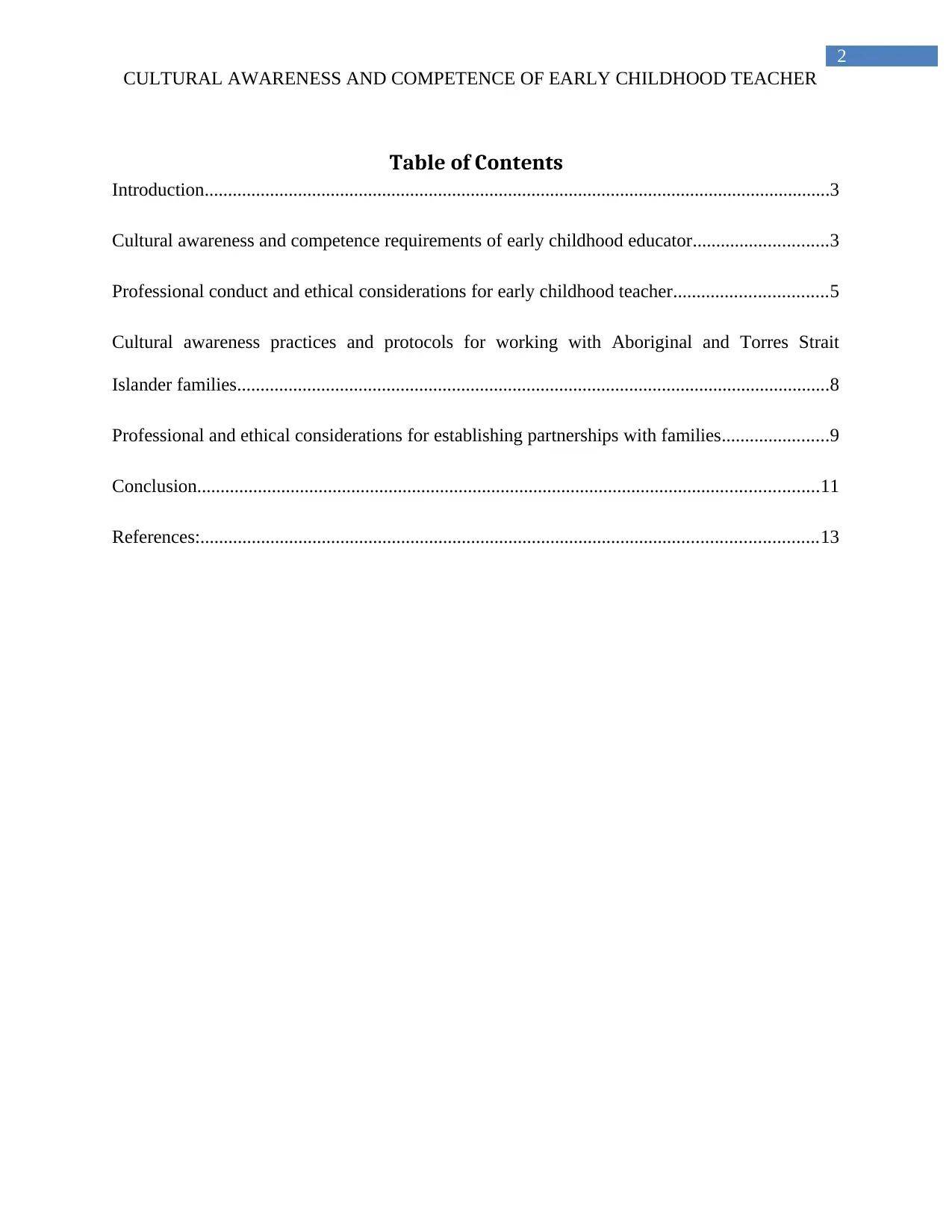
2
CULTURAL AWARENESS AND COMPETENCE OF EARLY CHILDHOOD TEACHER
Table of Contents
Introduction......................................................................................................................................3
Cultural awareness and competence requirements of early childhood educator.............................3
Professional conduct and ethical considerations for early childhood teacher.................................5
Cultural awareness practices and protocols for working with Aboriginal and Torres Strait
Islander families...............................................................................................................................8
Professional and ethical considerations for establishing partnerships with families.......................9
Conclusion.....................................................................................................................................11
References:....................................................................................................................................13
CULTURAL AWARENESS AND COMPETENCE OF EARLY CHILDHOOD TEACHER
Table of Contents
Introduction......................................................................................................................................3
Cultural awareness and competence requirements of early childhood educator.............................3
Professional conduct and ethical considerations for early childhood teacher.................................5
Cultural awareness practices and protocols for working with Aboriginal and Torres Strait
Islander families...............................................................................................................................8
Professional and ethical considerations for establishing partnerships with families.......................9
Conclusion.....................................................................................................................................11
References:....................................................................................................................................13
⊘ This is a preview!⊘
Do you want full access?
Subscribe today to unlock all pages.

Trusted by 1+ million students worldwide
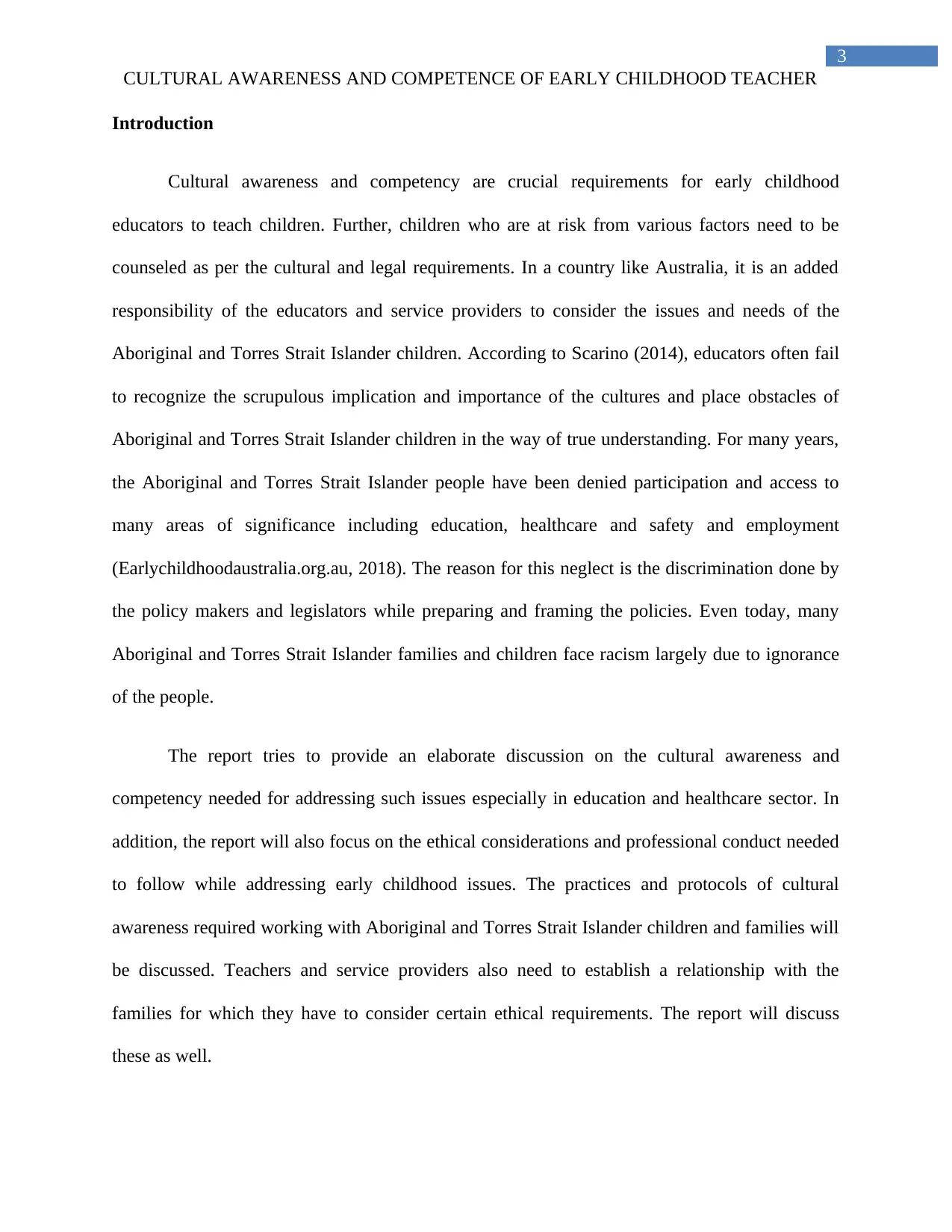
3
CULTURAL AWARENESS AND COMPETENCE OF EARLY CHILDHOOD TEACHER
Introduction
Cultural awareness and competency are crucial requirements for early childhood
educators to teach children. Further, children who are at risk from various factors need to be
counseled as per the cultural and legal requirements. In a country like Australia, it is an added
responsibility of the educators and service providers to consider the issues and needs of the
Aboriginal and Torres Strait Islander children. According to Scarino (2014), educators often fail
to recognize the scrupulous implication and importance of the cultures and place obstacles of
Aboriginal and Torres Strait Islander children in the way of true understanding. For many years,
the Aboriginal and Torres Strait Islander people have been denied participation and access to
many areas of significance including education, healthcare and safety and employment
(Earlychildhoodaustralia.org.au, 2018). The reason for this neglect is the discrimination done by
the policy makers and legislators while preparing and framing the policies. Even today, many
Aboriginal and Torres Strait Islander families and children face racism largely due to ignorance
of the people.
The report tries to provide an elaborate discussion on the cultural awareness and
competency needed for addressing such issues especially in education and healthcare sector. In
addition, the report will also focus on the ethical considerations and professional conduct needed
to follow while addressing early childhood issues. The practices and protocols of cultural
awareness required working with Aboriginal and Torres Strait Islander children and families will
be discussed. Teachers and service providers also need to establish a relationship with the
families for which they have to consider certain ethical requirements. The report will discuss
these as well.
CULTURAL AWARENESS AND COMPETENCE OF EARLY CHILDHOOD TEACHER
Introduction
Cultural awareness and competency are crucial requirements for early childhood
educators to teach children. Further, children who are at risk from various factors need to be
counseled as per the cultural and legal requirements. In a country like Australia, it is an added
responsibility of the educators and service providers to consider the issues and needs of the
Aboriginal and Torres Strait Islander children. According to Scarino (2014), educators often fail
to recognize the scrupulous implication and importance of the cultures and place obstacles of
Aboriginal and Torres Strait Islander children in the way of true understanding. For many years,
the Aboriginal and Torres Strait Islander people have been denied participation and access to
many areas of significance including education, healthcare and safety and employment
(Earlychildhoodaustralia.org.au, 2018). The reason for this neglect is the discrimination done by
the policy makers and legislators while preparing and framing the policies. Even today, many
Aboriginal and Torres Strait Islander families and children face racism largely due to ignorance
of the people.
The report tries to provide an elaborate discussion on the cultural awareness and
competency needed for addressing such issues especially in education and healthcare sector. In
addition, the report will also focus on the ethical considerations and professional conduct needed
to follow while addressing early childhood issues. The practices and protocols of cultural
awareness required working with Aboriginal and Torres Strait Islander children and families will
be discussed. Teachers and service providers also need to establish a relationship with the
families for which they have to consider certain ethical requirements. The report will discuss
these as well.
Paraphrase This Document
Need a fresh take? Get an instant paraphrase of this document with our AI Paraphraser
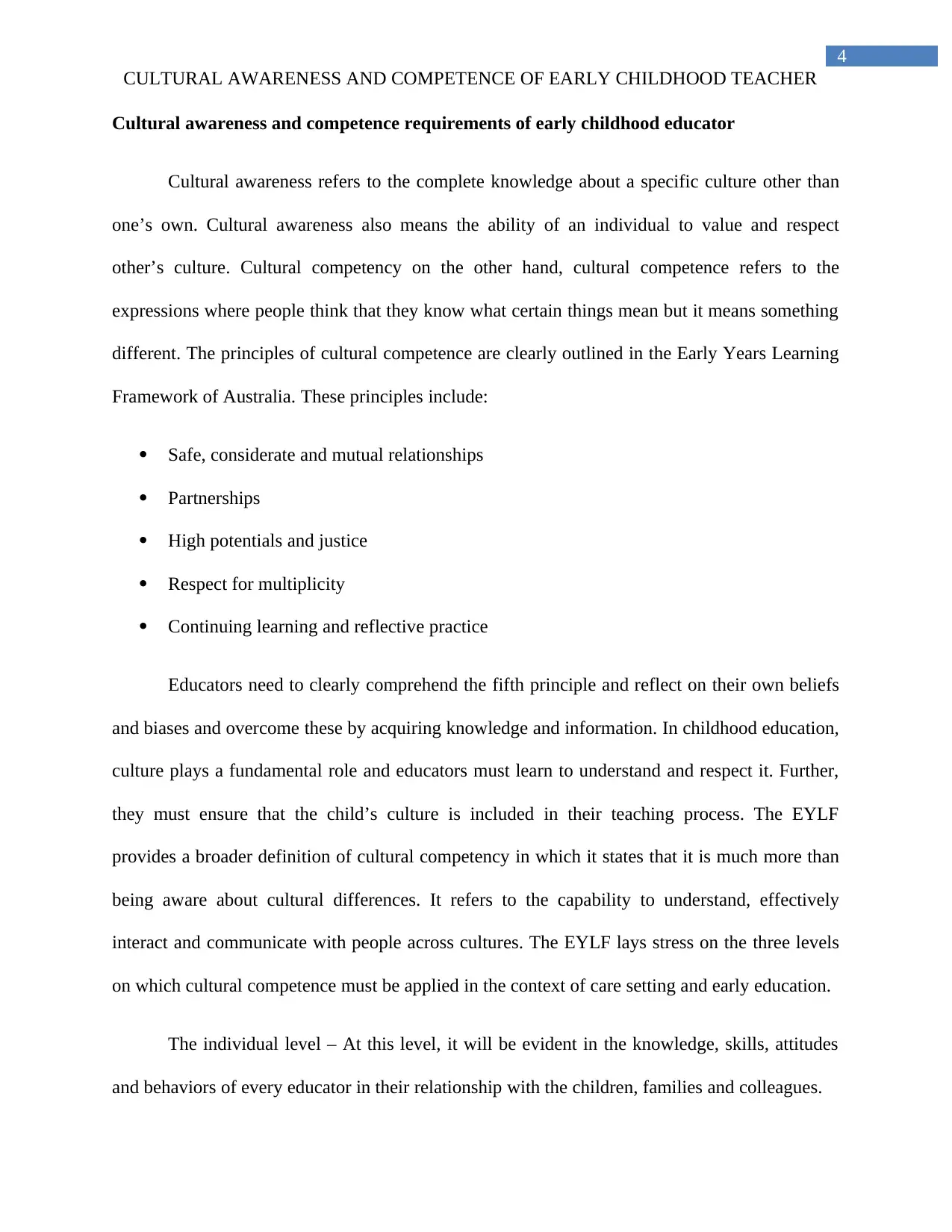
4
CULTURAL AWARENESS AND COMPETENCE OF EARLY CHILDHOOD TEACHER
Cultural awareness and competence requirements of early childhood educator
Cultural awareness refers to the complete knowledge about a specific culture other than
one’s own. Cultural awareness also means the ability of an individual to value and respect
other’s culture. Cultural competency on the other hand, cultural competence refers to the
expressions where people think that they know what certain things mean but it means something
different. The principles of cultural competence are clearly outlined in the Early Years Learning
Framework of Australia. These principles include:
Safe, considerate and mutual relationships
Partnerships
High potentials and justice
Respect for multiplicity
Continuing learning and reflective practice
Educators need to clearly comprehend the fifth principle and reflect on their own beliefs
and biases and overcome these by acquiring knowledge and information. In childhood education,
culture plays a fundamental role and educators must learn to understand and respect it. Further,
they must ensure that the child’s culture is included in their teaching process. The EYLF
provides a broader definition of cultural competency in which it states that it is much more than
being aware about cultural differences. It refers to the capability to understand, effectively
interact and communicate with people across cultures. The EYLF lays stress on the three levels
on which cultural competence must be applied in the context of care setting and early education.
The individual level – At this level, it will be evident in the knowledge, skills, attitudes
and behaviors of every educator in their relationship with the children, families and colleagues.
CULTURAL AWARENESS AND COMPETENCE OF EARLY CHILDHOOD TEACHER
Cultural awareness and competence requirements of early childhood educator
Cultural awareness refers to the complete knowledge about a specific culture other than
one’s own. Cultural awareness also means the ability of an individual to value and respect
other’s culture. Cultural competency on the other hand, cultural competence refers to the
expressions where people think that they know what certain things mean but it means something
different. The principles of cultural competence are clearly outlined in the Early Years Learning
Framework of Australia. These principles include:
Safe, considerate and mutual relationships
Partnerships
High potentials and justice
Respect for multiplicity
Continuing learning and reflective practice
Educators need to clearly comprehend the fifth principle and reflect on their own beliefs
and biases and overcome these by acquiring knowledge and information. In childhood education,
culture plays a fundamental role and educators must learn to understand and respect it. Further,
they must ensure that the child’s culture is included in their teaching process. The EYLF
provides a broader definition of cultural competency in which it states that it is much more than
being aware about cultural differences. It refers to the capability to understand, effectively
interact and communicate with people across cultures. The EYLF lays stress on the three levels
on which cultural competence must be applied in the context of care setting and early education.
The individual level – At this level, it will be evident in the knowledge, skills, attitudes
and behaviors of every educator in their relationship with the children, families and colleagues.
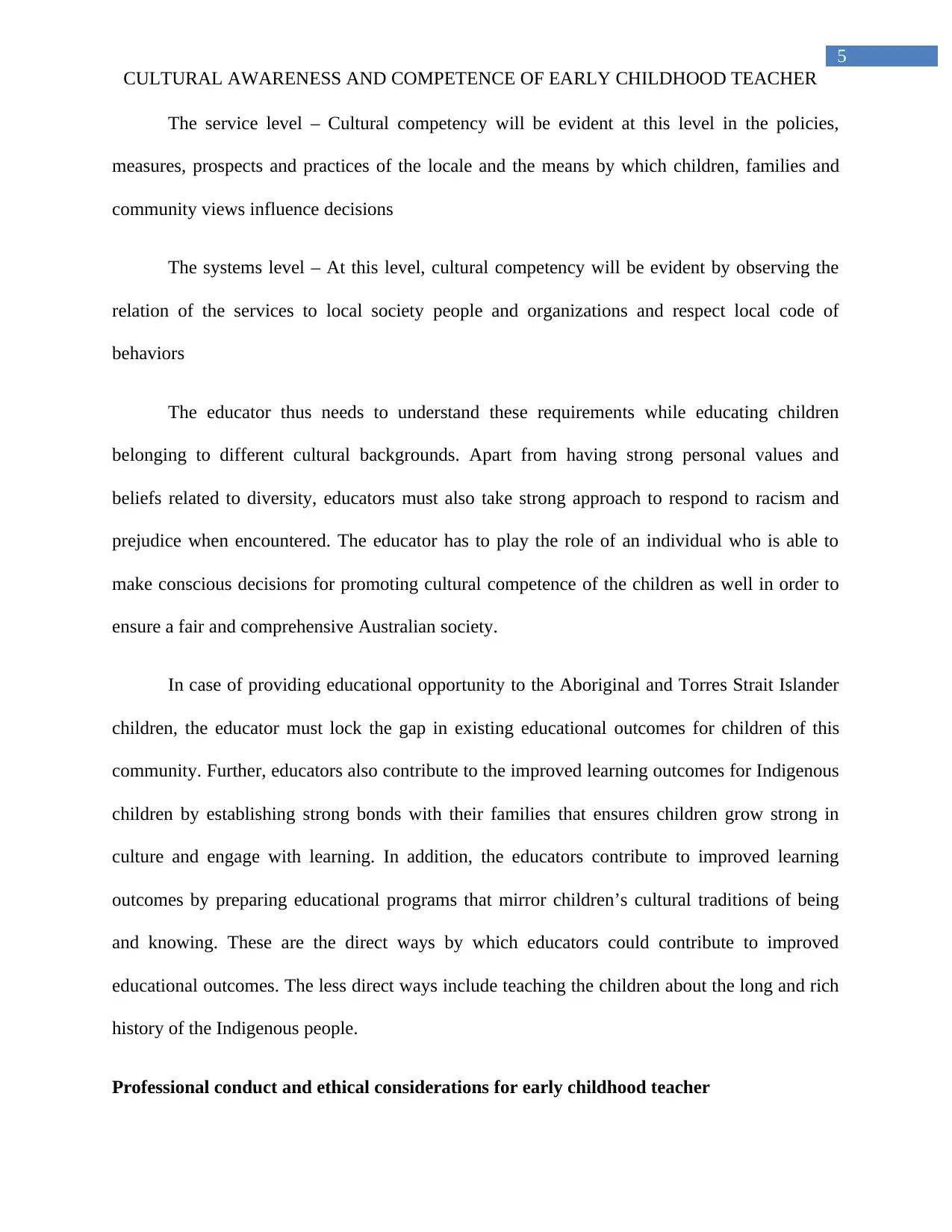
5
CULTURAL AWARENESS AND COMPETENCE OF EARLY CHILDHOOD TEACHER
The service level – Cultural competency will be evident at this level in the policies,
measures, prospects and practices of the locale and the means by which children, families and
community views influence decisions
The systems level – At this level, cultural competency will be evident by observing the
relation of the services to local society people and organizations and respect local code of
behaviors
The educator thus needs to understand these requirements while educating children
belonging to different cultural backgrounds. Apart from having strong personal values and
beliefs related to diversity, educators must also take strong approach to respond to racism and
prejudice when encountered. The educator has to play the role of an individual who is able to
make conscious decisions for promoting cultural competence of the children as well in order to
ensure a fair and comprehensive Australian society.
In case of providing educational opportunity to the Aboriginal and Torres Strait Islander
children, the educator must lock the gap in existing educational outcomes for children of this
community. Further, educators also contribute to the improved learning outcomes for Indigenous
children by establishing strong bonds with their families that ensures children grow strong in
culture and engage with learning. In addition, the educators contribute to improved learning
outcomes by preparing educational programs that mirror children’s cultural traditions of being
and knowing. These are the direct ways by which educators could contribute to improved
educational outcomes. The less direct ways include teaching the children about the long and rich
history of the Indigenous people.
Professional conduct and ethical considerations for early childhood teacher
CULTURAL AWARENESS AND COMPETENCE OF EARLY CHILDHOOD TEACHER
The service level – Cultural competency will be evident at this level in the policies,
measures, prospects and practices of the locale and the means by which children, families and
community views influence decisions
The systems level – At this level, cultural competency will be evident by observing the
relation of the services to local society people and organizations and respect local code of
behaviors
The educator thus needs to understand these requirements while educating children
belonging to different cultural backgrounds. Apart from having strong personal values and
beliefs related to diversity, educators must also take strong approach to respond to racism and
prejudice when encountered. The educator has to play the role of an individual who is able to
make conscious decisions for promoting cultural competence of the children as well in order to
ensure a fair and comprehensive Australian society.
In case of providing educational opportunity to the Aboriginal and Torres Strait Islander
children, the educator must lock the gap in existing educational outcomes for children of this
community. Further, educators also contribute to the improved learning outcomes for Indigenous
children by establishing strong bonds with their families that ensures children grow strong in
culture and engage with learning. In addition, the educators contribute to improved learning
outcomes by preparing educational programs that mirror children’s cultural traditions of being
and knowing. These are the direct ways by which educators could contribute to improved
educational outcomes. The less direct ways include teaching the children about the long and rich
history of the Indigenous people.
Professional conduct and ethical considerations for early childhood teacher
⊘ This is a preview!⊘
Do you want full access?
Subscribe today to unlock all pages.

Trusted by 1+ million students worldwide
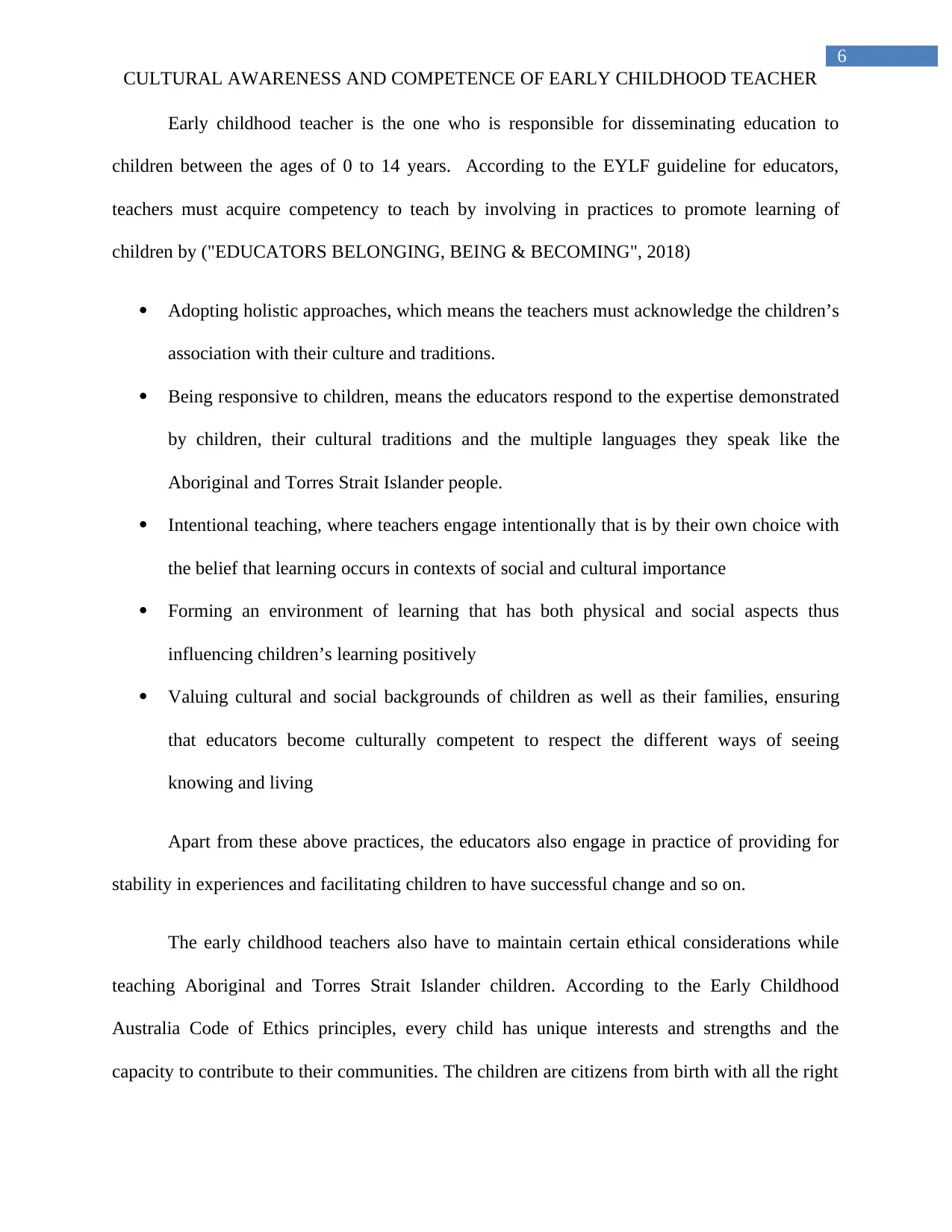
6
CULTURAL AWARENESS AND COMPETENCE OF EARLY CHILDHOOD TEACHER
Early childhood teacher is the one who is responsible for disseminating education to
children between the ages of 0 to 14 years. According to the EYLF guideline for educators,
teachers must acquire competency to teach by involving in practices to promote learning of
children by ("EDUCATORS BELONGING, BEING & BECOMING", 2018)
Adopting holistic approaches, which means the teachers must acknowledge the children’s
association with their culture and traditions.
Being responsive to children, means the educators respond to the expertise demonstrated
by children, their cultural traditions and the multiple languages they speak like the
Aboriginal and Torres Strait Islander people.
Intentional teaching, where teachers engage intentionally that is by their own choice with
the belief that learning occurs in contexts of social and cultural importance
Forming an environment of learning that has both physical and social aspects thus
influencing children’s learning positively
Valuing cultural and social backgrounds of children as well as their families, ensuring
that educators become culturally competent to respect the different ways of seeing
knowing and living
Apart from these above practices, the educators also engage in practice of providing for
stability in experiences and facilitating children to have successful change and so on.
The early childhood teachers also have to maintain certain ethical considerations while
teaching Aboriginal and Torres Strait Islander children. According to the Early Childhood
Australia Code of Ethics principles, every child has unique interests and strengths and the
capacity to contribute to their communities. The children are citizens from birth with all the right
CULTURAL AWARENESS AND COMPETENCE OF EARLY CHILDHOOD TEACHER
Early childhood teacher is the one who is responsible for disseminating education to
children between the ages of 0 to 14 years. According to the EYLF guideline for educators,
teachers must acquire competency to teach by involving in practices to promote learning of
children by ("EDUCATORS BELONGING, BEING & BECOMING", 2018)
Adopting holistic approaches, which means the teachers must acknowledge the children’s
association with their culture and traditions.
Being responsive to children, means the educators respond to the expertise demonstrated
by children, their cultural traditions and the multiple languages they speak like the
Aboriginal and Torres Strait Islander people.
Intentional teaching, where teachers engage intentionally that is by their own choice with
the belief that learning occurs in contexts of social and cultural importance
Forming an environment of learning that has both physical and social aspects thus
influencing children’s learning positively
Valuing cultural and social backgrounds of children as well as their families, ensuring
that educators become culturally competent to respect the different ways of seeing
knowing and living
Apart from these above practices, the educators also engage in practice of providing for
stability in experiences and facilitating children to have successful change and so on.
The early childhood teachers also have to maintain certain ethical considerations while
teaching Aboriginal and Torres Strait Islander children. According to the Early Childhood
Australia Code of Ethics principles, every child has unique interests and strengths and the
capacity to contribute to their communities. The children are citizens from birth with all the right
Paraphrase This Document
Need a fresh take? Get an instant paraphrase of this document with our AI Paraphraser
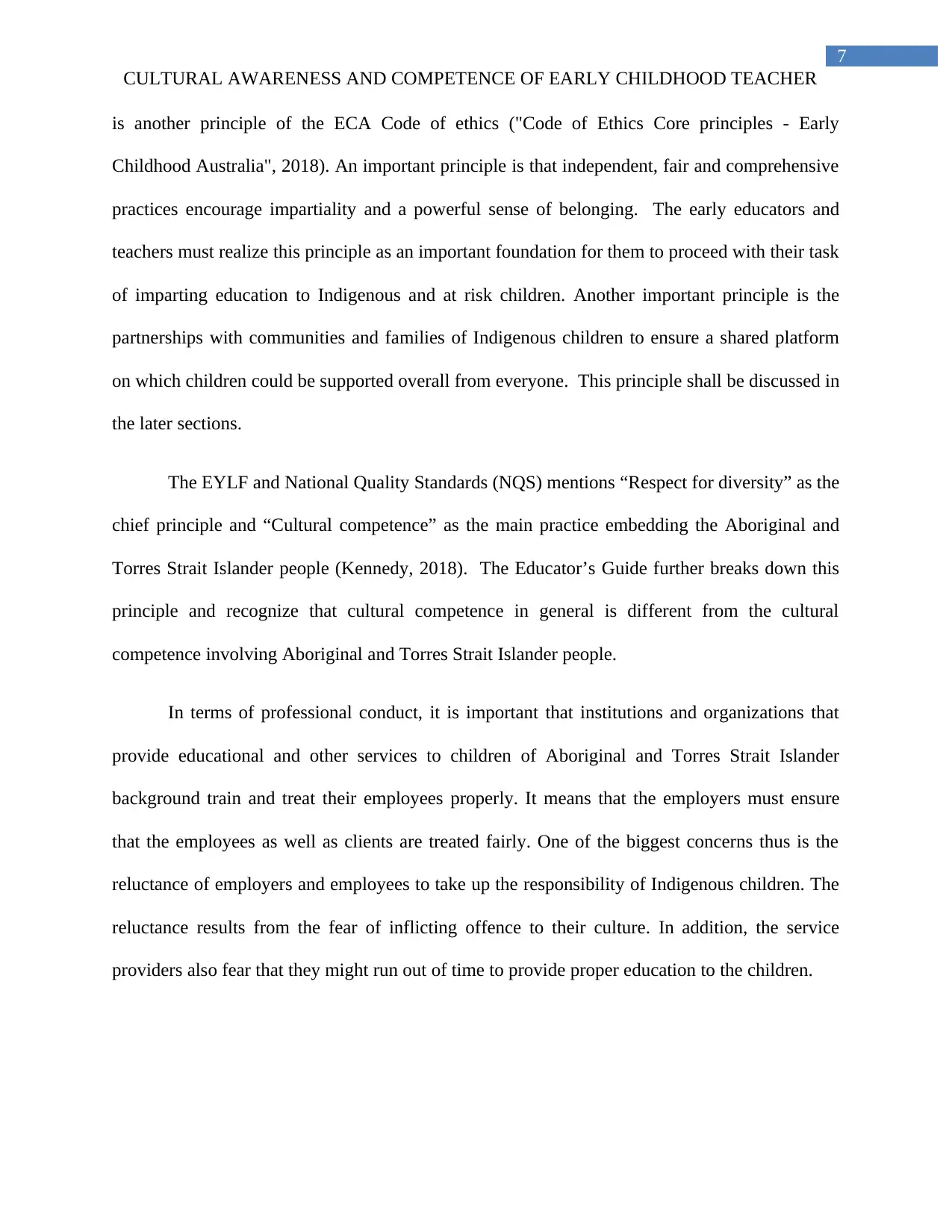
7
CULTURAL AWARENESS AND COMPETENCE OF EARLY CHILDHOOD TEACHER
is another principle of the ECA Code of ethics ("Code of Ethics Core principles - Early
Childhood Australia", 2018). An important principle is that independent, fair and comprehensive
practices encourage impartiality and a powerful sense of belonging. The early educators and
teachers must realize this principle as an important foundation for them to proceed with their task
of imparting education to Indigenous and at risk children. Another important principle is the
partnerships with communities and families of Indigenous children to ensure a shared platform
on which children could be supported overall from everyone. This principle shall be discussed in
the later sections.
The EYLF and National Quality Standards (NQS) mentions “Respect for diversity” as the
chief principle and “Cultural competence” as the main practice embedding the Aboriginal and
Torres Strait Islander people (Kennedy, 2018). The Educator’s Guide further breaks down this
principle and recognize that cultural competence in general is different from the cultural
competence involving Aboriginal and Torres Strait Islander people.
In terms of professional conduct, it is important that institutions and organizations that
provide educational and other services to children of Aboriginal and Torres Strait Islander
background train and treat their employees properly. It means that the employers must ensure
that the employees as well as clients are treated fairly. One of the biggest concerns thus is the
reluctance of employers and employees to take up the responsibility of Indigenous children. The
reluctance results from the fear of inflicting offence to their culture. In addition, the service
providers also fear that they might run out of time to provide proper education to the children.
CULTURAL AWARENESS AND COMPETENCE OF EARLY CHILDHOOD TEACHER
is another principle of the ECA Code of ethics ("Code of Ethics Core principles - Early
Childhood Australia", 2018). An important principle is that independent, fair and comprehensive
practices encourage impartiality and a powerful sense of belonging. The early educators and
teachers must realize this principle as an important foundation for them to proceed with their task
of imparting education to Indigenous and at risk children. Another important principle is the
partnerships with communities and families of Indigenous children to ensure a shared platform
on which children could be supported overall from everyone. This principle shall be discussed in
the later sections.
The EYLF and National Quality Standards (NQS) mentions “Respect for diversity” as the
chief principle and “Cultural competence” as the main practice embedding the Aboriginal and
Torres Strait Islander people (Kennedy, 2018). The Educator’s Guide further breaks down this
principle and recognize that cultural competence in general is different from the cultural
competence involving Aboriginal and Torres Strait Islander people.
In terms of professional conduct, it is important that institutions and organizations that
provide educational and other services to children of Aboriginal and Torres Strait Islander
background train and treat their employees properly. It means that the employers must ensure
that the employees as well as clients are treated fairly. One of the biggest concerns thus is the
reluctance of employers and employees to take up the responsibility of Indigenous children. The
reluctance results from the fear of inflicting offence to their culture. In addition, the service
providers also fear that they might run out of time to provide proper education to the children.
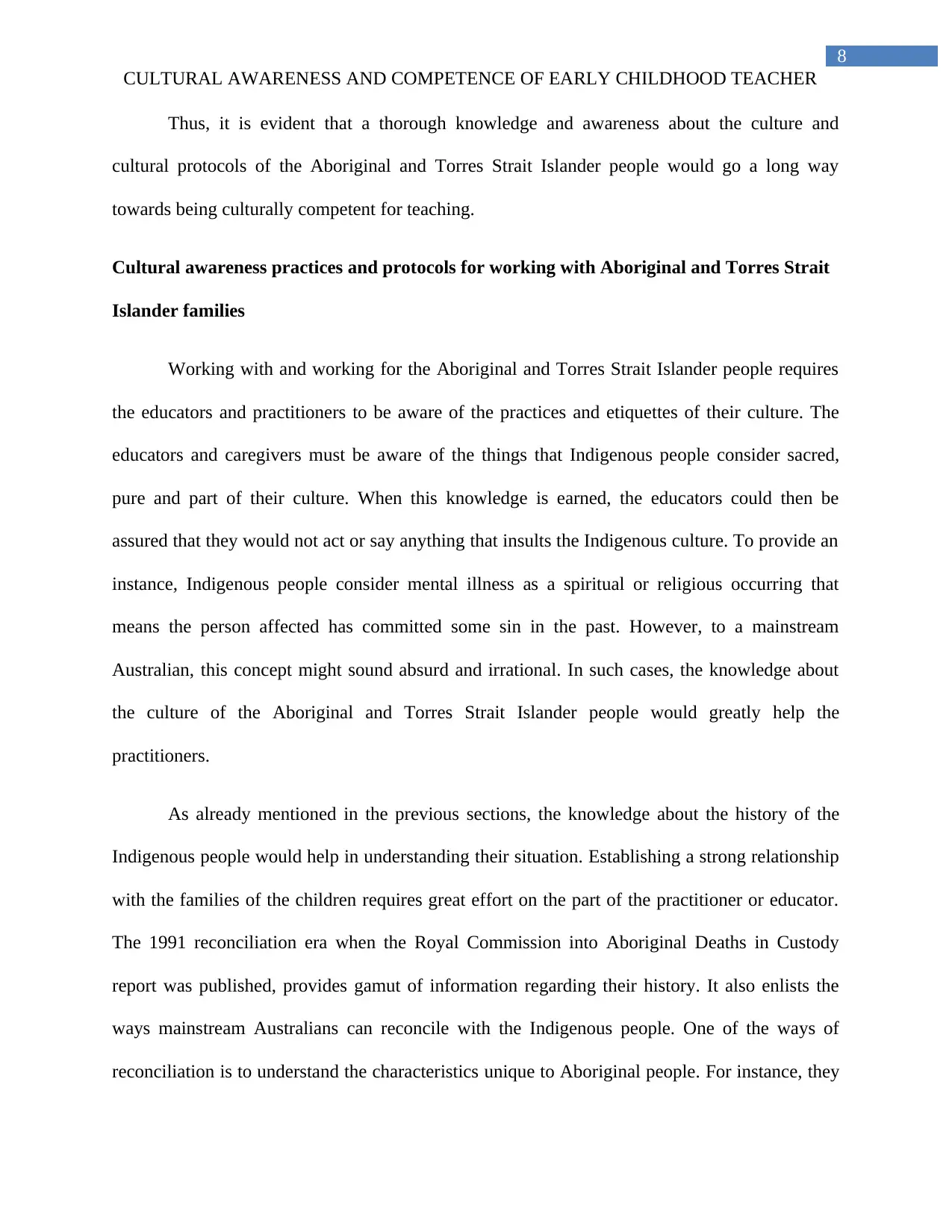
8
CULTURAL AWARENESS AND COMPETENCE OF EARLY CHILDHOOD TEACHER
Thus, it is evident that a thorough knowledge and awareness about the culture and
cultural protocols of the Aboriginal and Torres Strait Islander people would go a long way
towards being culturally competent for teaching.
Cultural awareness practices and protocols for working with Aboriginal and Torres Strait
Islander families
Working with and working for the Aboriginal and Torres Strait Islander people requires
the educators and practitioners to be aware of the practices and etiquettes of their culture. The
educators and caregivers must be aware of the things that Indigenous people consider sacred,
pure and part of their culture. When this knowledge is earned, the educators could then be
assured that they would not act or say anything that insults the Indigenous culture. To provide an
instance, Indigenous people consider mental illness as a spiritual or religious occurring that
means the person affected has committed some sin in the past. However, to a mainstream
Australian, this concept might sound absurd and irrational. In such cases, the knowledge about
the culture of the Aboriginal and Torres Strait Islander people would greatly help the
practitioners.
As already mentioned in the previous sections, the knowledge about the history of the
Indigenous people would help in understanding their situation. Establishing a strong relationship
with the families of the children requires great effort on the part of the practitioner or educator.
The 1991 reconciliation era when the Royal Commission into Aboriginal Deaths in Custody
report was published, provides gamut of information regarding their history. It also enlists the
ways mainstream Australians can reconcile with the Indigenous people. One of the ways of
reconciliation is to understand the characteristics unique to Aboriginal people. For instance, they
CULTURAL AWARENESS AND COMPETENCE OF EARLY CHILDHOOD TEACHER
Thus, it is evident that a thorough knowledge and awareness about the culture and
cultural protocols of the Aboriginal and Torres Strait Islander people would go a long way
towards being culturally competent for teaching.
Cultural awareness practices and protocols for working with Aboriginal and Torres Strait
Islander families
Working with and working for the Aboriginal and Torres Strait Islander people requires
the educators and practitioners to be aware of the practices and etiquettes of their culture. The
educators and caregivers must be aware of the things that Indigenous people consider sacred,
pure and part of their culture. When this knowledge is earned, the educators could then be
assured that they would not act or say anything that insults the Indigenous culture. To provide an
instance, Indigenous people consider mental illness as a spiritual or religious occurring that
means the person affected has committed some sin in the past. However, to a mainstream
Australian, this concept might sound absurd and irrational. In such cases, the knowledge about
the culture of the Aboriginal and Torres Strait Islander people would greatly help the
practitioners.
As already mentioned in the previous sections, the knowledge about the history of the
Indigenous people would help in understanding their situation. Establishing a strong relationship
with the families of the children requires great effort on the part of the practitioner or educator.
The 1991 reconciliation era when the Royal Commission into Aboriginal Deaths in Custody
report was published, provides gamut of information regarding their history. It also enlists the
ways mainstream Australians can reconcile with the Indigenous people. One of the ways of
reconciliation is to understand the characteristics unique to Aboriginal people. For instance, they
⊘ This is a preview!⊘
Do you want full access?
Subscribe today to unlock all pages.

Trusted by 1+ million students worldwide
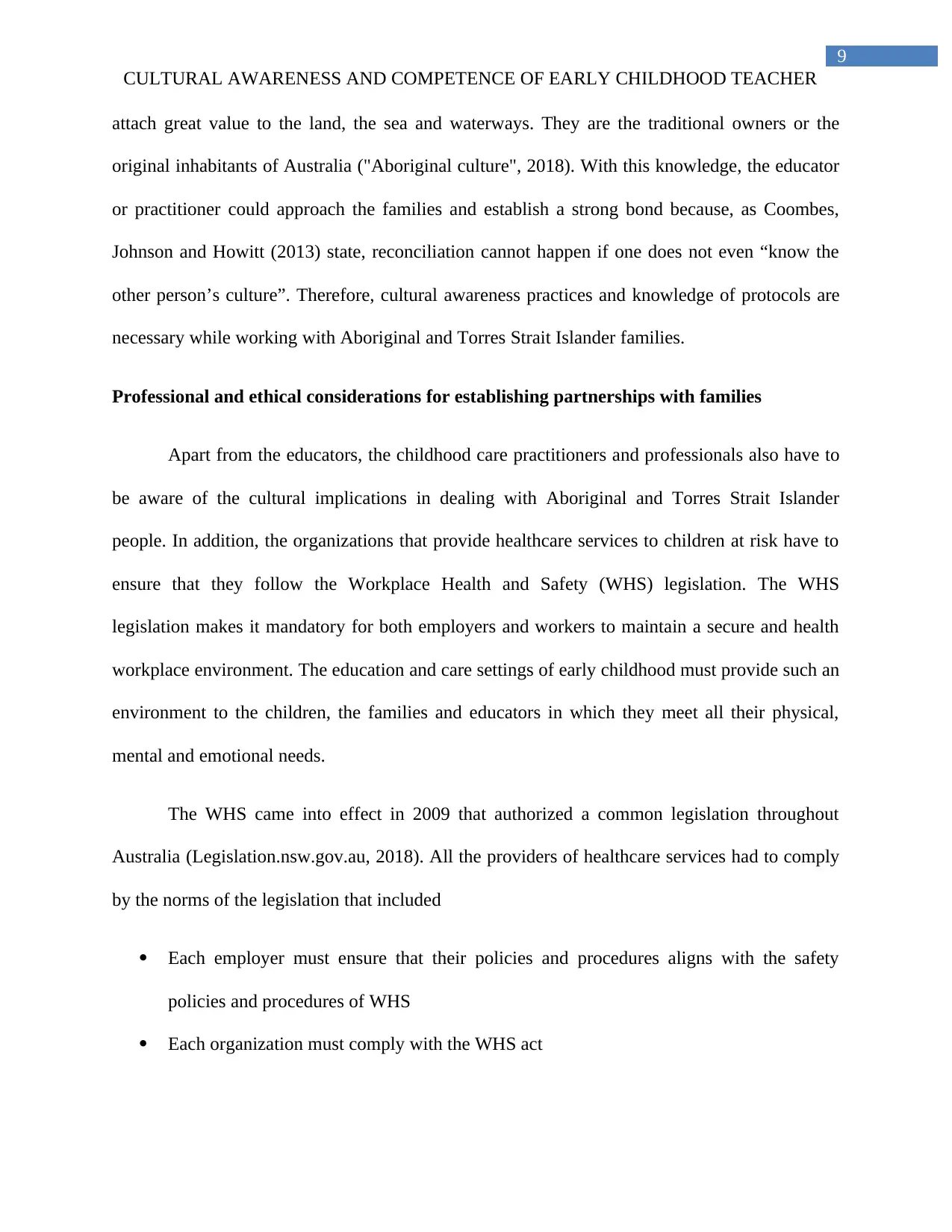
9
CULTURAL AWARENESS AND COMPETENCE OF EARLY CHILDHOOD TEACHER
attach great value to the land, the sea and waterways. They are the traditional owners or the
original inhabitants of Australia ("Aboriginal culture", 2018). With this knowledge, the educator
or practitioner could approach the families and establish a strong bond because, as Coombes,
Johnson and Howitt (2013) state, reconciliation cannot happen if one does not even “know the
other person’s culture”. Therefore, cultural awareness practices and knowledge of protocols are
necessary while working with Aboriginal and Torres Strait Islander families.
Professional and ethical considerations for establishing partnerships with families
Apart from the educators, the childhood care practitioners and professionals also have to
be aware of the cultural implications in dealing with Aboriginal and Torres Strait Islander
people. In addition, the organizations that provide healthcare services to children at risk have to
ensure that they follow the Workplace Health and Safety (WHS) legislation. The WHS
legislation makes it mandatory for both employers and workers to maintain a secure and health
workplace environment. The education and care settings of early childhood must provide such an
environment to the children, the families and educators in which they meet all their physical,
mental and emotional needs.
The WHS came into effect in 2009 that authorized a common legislation throughout
Australia (Legislation.nsw.gov.au, 2018). All the providers of healthcare services had to comply
by the norms of the legislation that included
Each employer must ensure that their policies and procedures aligns with the safety
policies and procedures of WHS
Each organization must comply with the WHS act
CULTURAL AWARENESS AND COMPETENCE OF EARLY CHILDHOOD TEACHER
attach great value to the land, the sea and waterways. They are the traditional owners or the
original inhabitants of Australia ("Aboriginal culture", 2018). With this knowledge, the educator
or practitioner could approach the families and establish a strong bond because, as Coombes,
Johnson and Howitt (2013) state, reconciliation cannot happen if one does not even “know the
other person’s culture”. Therefore, cultural awareness practices and knowledge of protocols are
necessary while working with Aboriginal and Torres Strait Islander families.
Professional and ethical considerations for establishing partnerships with families
Apart from the educators, the childhood care practitioners and professionals also have to
be aware of the cultural implications in dealing with Aboriginal and Torres Strait Islander
people. In addition, the organizations that provide healthcare services to children at risk have to
ensure that they follow the Workplace Health and Safety (WHS) legislation. The WHS
legislation makes it mandatory for both employers and workers to maintain a secure and health
workplace environment. The education and care settings of early childhood must provide such an
environment to the children, the families and educators in which they meet all their physical,
mental and emotional needs.
The WHS came into effect in 2009 that authorized a common legislation throughout
Australia (Legislation.nsw.gov.au, 2018). All the providers of healthcare services had to comply
by the norms of the legislation that included
Each employer must ensure that their policies and procedures aligns with the safety
policies and procedures of WHS
Each organization must comply with the WHS act
Paraphrase This Document
Need a fresh take? Get an instant paraphrase of this document with our AI Paraphraser
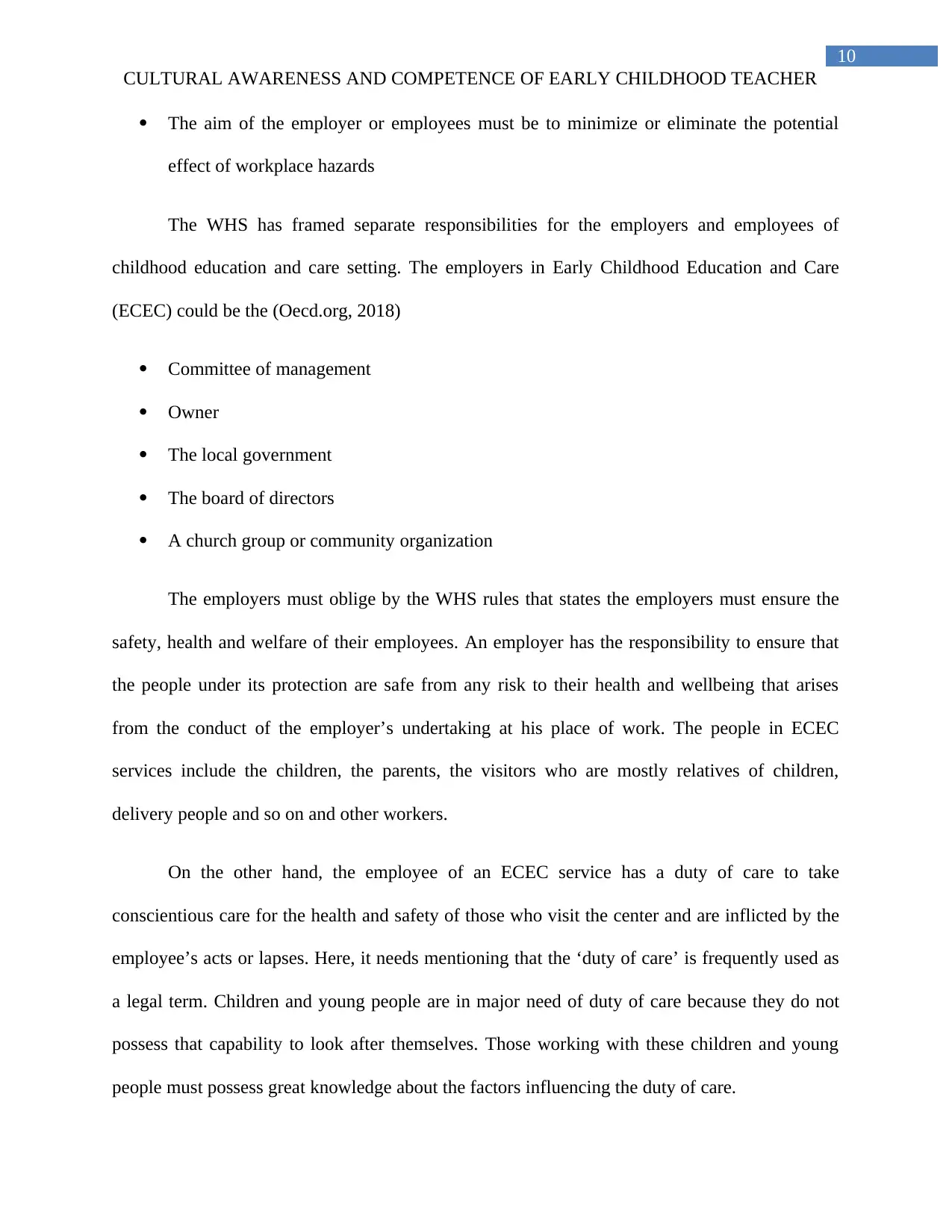
10
CULTURAL AWARENESS AND COMPETENCE OF EARLY CHILDHOOD TEACHER
The aim of the employer or employees must be to minimize or eliminate the potential
effect of workplace hazards
The WHS has framed separate responsibilities for the employers and employees of
childhood education and care setting. The employers in Early Childhood Education and Care
(ECEC) could be the (Oecd.org, 2018)
Committee of management
Owner
The local government
The board of directors
A church group or community organization
The employers must oblige by the WHS rules that states the employers must ensure the
safety, health and welfare of their employees. An employer has the responsibility to ensure that
the people under its protection are safe from any risk to their health and wellbeing that arises
from the conduct of the employer’s undertaking at his place of work. The people in ECEC
services include the children, the parents, the visitors who are mostly relatives of children,
delivery people and so on and other workers.
On the other hand, the employee of an ECEC service has a duty of care to take
conscientious care for the health and safety of those who visit the center and are inflicted by the
employee’s acts or lapses. Here, it needs mentioning that the ‘duty of care’ is frequently used as
a legal term. Children and young people are in major need of duty of care because they do not
possess that capability to look after themselves. Those working with these children and young
people must possess great knowledge about the factors influencing the duty of care.
CULTURAL AWARENESS AND COMPETENCE OF EARLY CHILDHOOD TEACHER
The aim of the employer or employees must be to minimize or eliminate the potential
effect of workplace hazards
The WHS has framed separate responsibilities for the employers and employees of
childhood education and care setting. The employers in Early Childhood Education and Care
(ECEC) could be the (Oecd.org, 2018)
Committee of management
Owner
The local government
The board of directors
A church group or community organization
The employers must oblige by the WHS rules that states the employers must ensure the
safety, health and welfare of their employees. An employer has the responsibility to ensure that
the people under its protection are safe from any risk to their health and wellbeing that arises
from the conduct of the employer’s undertaking at his place of work. The people in ECEC
services include the children, the parents, the visitors who are mostly relatives of children,
delivery people and so on and other workers.
On the other hand, the employee of an ECEC service has a duty of care to take
conscientious care for the health and safety of those who visit the center and are inflicted by the
employee’s acts or lapses. Here, it needs mentioning that the ‘duty of care’ is frequently used as
a legal term. Children and young people are in major need of duty of care because they do not
possess that capability to look after themselves. Those working with these children and young
people must possess great knowledge about the factors influencing the duty of care.
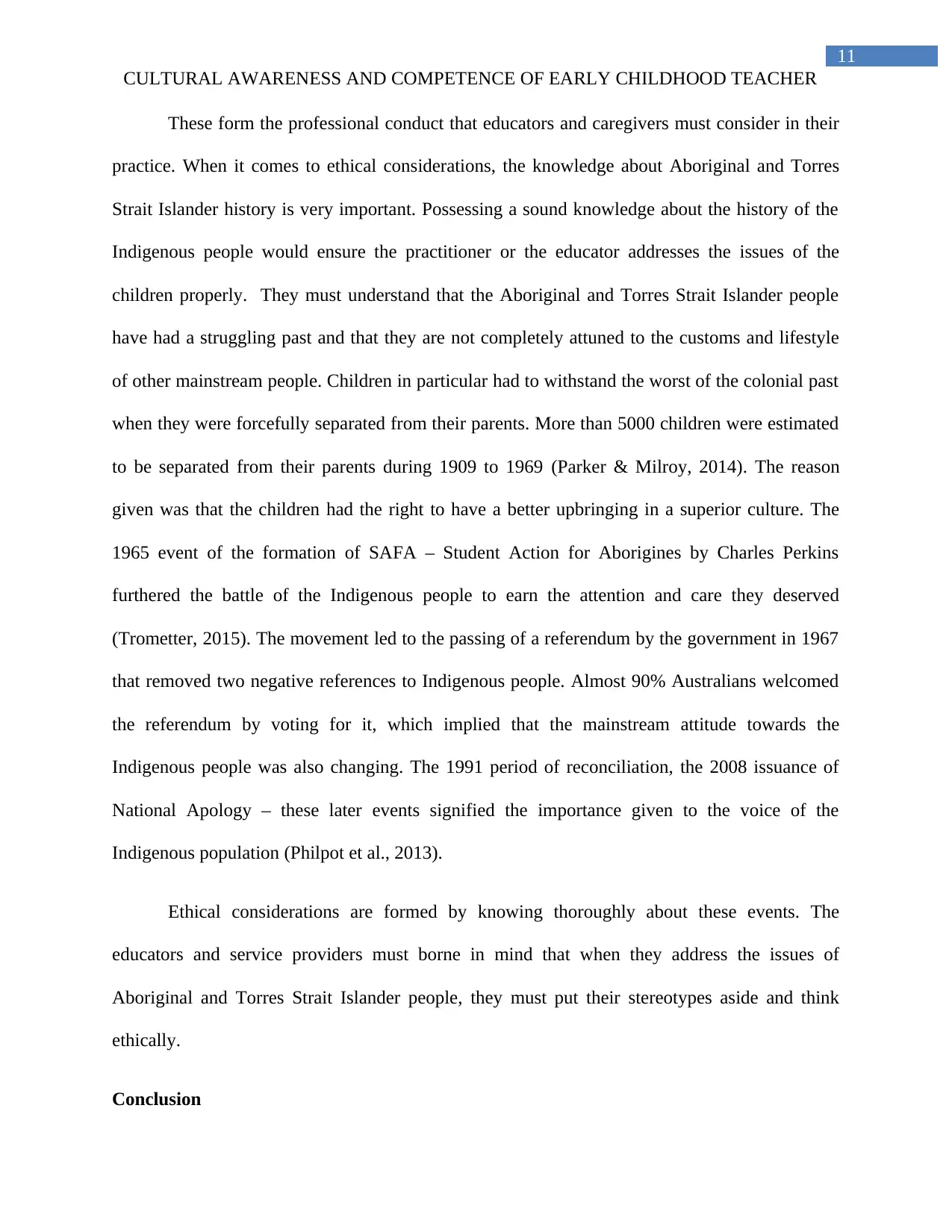
11
CULTURAL AWARENESS AND COMPETENCE OF EARLY CHILDHOOD TEACHER
These form the professional conduct that educators and caregivers must consider in their
practice. When it comes to ethical considerations, the knowledge about Aboriginal and Torres
Strait Islander history is very important. Possessing a sound knowledge about the history of the
Indigenous people would ensure the practitioner or the educator addresses the issues of the
children properly. They must understand that the Aboriginal and Torres Strait Islander people
have had a struggling past and that they are not completely attuned to the customs and lifestyle
of other mainstream people. Children in particular had to withstand the worst of the colonial past
when they were forcefully separated from their parents. More than 5000 children were estimated
to be separated from their parents during 1909 to 1969 (Parker & Milroy, 2014). The reason
given was that the children had the right to have a better upbringing in a superior culture. The
1965 event of the formation of SAFA – Student Action for Aborigines by Charles Perkins
furthered the battle of the Indigenous people to earn the attention and care they deserved
(Trometter, 2015). The movement led to the passing of a referendum by the government in 1967
that removed two negative references to Indigenous people. Almost 90% Australians welcomed
the referendum by voting for it, which implied that the mainstream attitude towards the
Indigenous people was also changing. The 1991 period of reconciliation, the 2008 issuance of
National Apology – these later events signified the importance given to the voice of the
Indigenous population (Philpot et al., 2013).
Ethical considerations are formed by knowing thoroughly about these events. The
educators and service providers must borne in mind that when they address the issues of
Aboriginal and Torres Strait Islander people, they must put their stereotypes aside and think
ethically.
Conclusion
CULTURAL AWARENESS AND COMPETENCE OF EARLY CHILDHOOD TEACHER
These form the professional conduct that educators and caregivers must consider in their
practice. When it comes to ethical considerations, the knowledge about Aboriginal and Torres
Strait Islander history is very important. Possessing a sound knowledge about the history of the
Indigenous people would ensure the practitioner or the educator addresses the issues of the
children properly. They must understand that the Aboriginal and Torres Strait Islander people
have had a struggling past and that they are not completely attuned to the customs and lifestyle
of other mainstream people. Children in particular had to withstand the worst of the colonial past
when they were forcefully separated from their parents. More than 5000 children were estimated
to be separated from their parents during 1909 to 1969 (Parker & Milroy, 2014). The reason
given was that the children had the right to have a better upbringing in a superior culture. The
1965 event of the formation of SAFA – Student Action for Aborigines by Charles Perkins
furthered the battle of the Indigenous people to earn the attention and care they deserved
(Trometter, 2015). The movement led to the passing of a referendum by the government in 1967
that removed two negative references to Indigenous people. Almost 90% Australians welcomed
the referendum by voting for it, which implied that the mainstream attitude towards the
Indigenous people was also changing. The 1991 period of reconciliation, the 2008 issuance of
National Apology – these later events signified the importance given to the voice of the
Indigenous population (Philpot et al., 2013).
Ethical considerations are formed by knowing thoroughly about these events. The
educators and service providers must borne in mind that when they address the issues of
Aboriginal and Torres Strait Islander people, they must put their stereotypes aside and think
ethically.
Conclusion
⊘ This is a preview!⊘
Do you want full access?
Subscribe today to unlock all pages.

Trusted by 1+ million students worldwide
1 out of 15
Related Documents
Your All-in-One AI-Powered Toolkit for Academic Success.
+13062052269
info@desklib.com
Available 24*7 on WhatsApp / Email
![[object Object]](/_next/static/media/star-bottom.7253800d.svg)
Unlock your academic potential
Copyright © 2020–2026 A2Z Services. All Rights Reserved. Developed and managed by ZUCOL.




